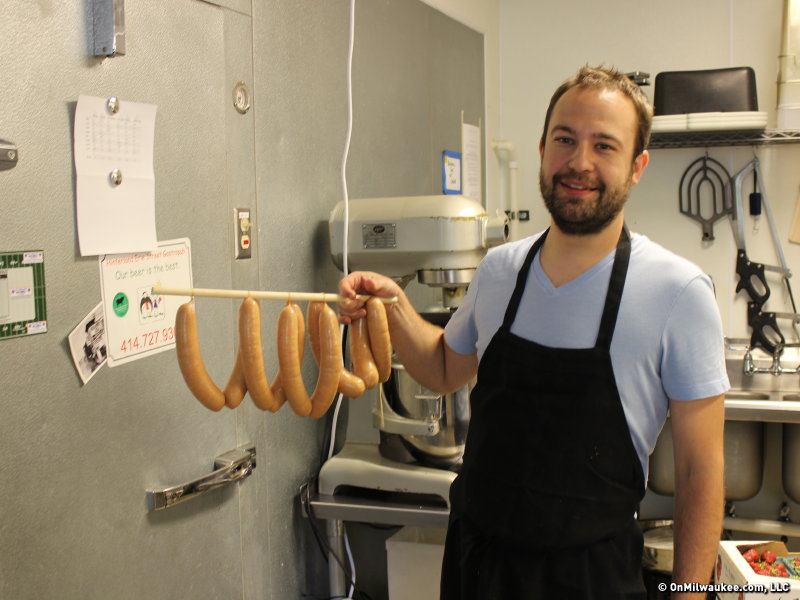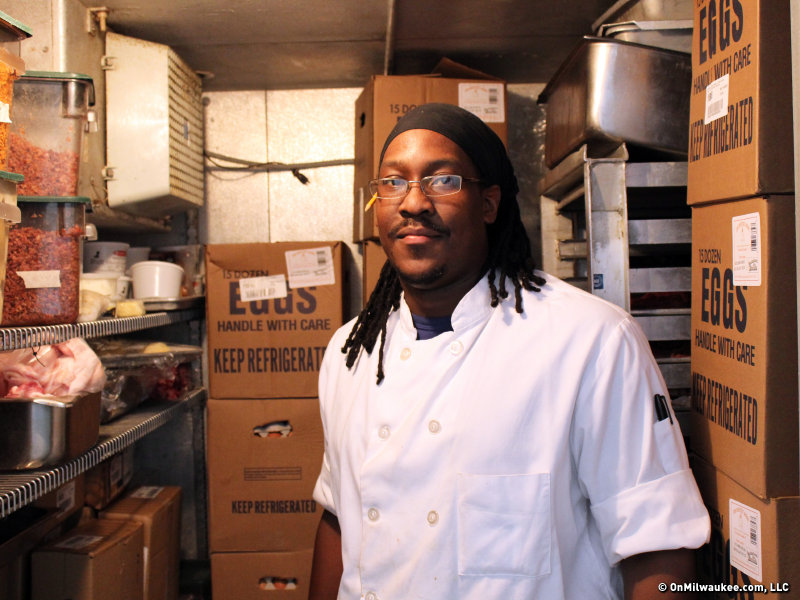Paul Funk planned on attending Western Culinary in Portland. But, in 2002 a friend in Colorado invited him to visit over spring break, and he decided to stay. He apprenticed for Vale resorts before heading to Wyoming to take a job as a cook on a private ranch.
Despite more glamorous sounding stints in the south of France and Florence, Italy, where he first learned about wine, olive oil and the art of butchery, Funk cites the opportunities he encountered in Wyoming as formative.
"It was super remote and isolated," he recalls, "which is why I eventually left. But, it was pretty incredible. We had two kitchens – one inside, and one outside … a wood burning oven, a rotisserie. My roommate was the gardener, and she grew what I asked her to. She had a 3,000-foot greenhouse, plus about equal that space outside."
Just before Christmas in 2009, Funk moved back to Milwaukee. He says he spent about about six months underemployed, hanging out at Hinterland over his lunch hour. Eventually, his time paid off. There was a month-long fill-in spot available, and he got the job.
"I started out working the grill," he recalls. "My first night was terrible. I hadn’t line cooked in years. So, I was super rusty and it didn’t go well. I’m pretty sure while I was cleaning up they were all talking in the back about how I probably wasn’t going to last."
Funk, who handles all things charcuterie at Hinterland, is among an elite group of local chefs doing in-house butchering to not only use the straightforward "choice" cuts, but everything else as well, making sausages, pâtés, rillettes, head cheese and cured meats.
We sat down to talk over coffee one morning in the Hinterland bar, and I asked Funk to tell me a little bit more about himself and the work he does.
OnMilwaukee.com: What made you choose food as your career?
Paul Funk: You know… I always really loved to cook. As a kid I would spend time with my dad’s mom. I’d call her up on the phone and ask her how to make chicken dumpling soup. I was too young to write, so I’d call her, get instructions for two or three steps at a time. After I’d finished those, I’d call her back and get a few more.
I also remember … in first grade, we did this stone soup thing. My teacher had these stones she claimed were from the story. And we made soup.
Fast forward to college and I was a bartender in a Bennigan’s. I watched the line cooks, how they were so busy. It seemed similar to bartending, having to keep up the pace. But, it seemed more exciting. I also started watching the Food Network and cooking for friends and family. People told me I was good at it.
OMC: What do you wish you had known when you took your first sous chef position?
PF: It’s weird because Hinterland was my first sous position, but I was kind of accustomed to the ordering and all that because of the ranch. But, there I wasn’t managing anyone.
You get to do a little less of what you love to do, and what you’re best at. You have to delegate that. And I’m still not good at that. I should be trusting someone else to make up my sausage cures.
But, being the sous means you’re having to take every phone call from every fish person, every vendor, rather than spending time in the kitchen cooking.
OMC: From your point of view, what’s the most important role a sous chef plays?
PF: Here it’s to help everyone in the kitchen express their styles, their visions, but also keep things consistent with what Hinterland currently is. Basically, it’s my job to give them their freedom, but also to create those boundaries, and to nurture younger cooks. We’ve got a couple of interns… and you really want to give them the opportunity to someday do what Danny [Van Rite] and I and the rest of the staff are doing.
OMC: What do you find most challenging about what you do?
PF: The hardest part is getting beyond the day to day. It’s really easy to focus on how many reservations we have and what’s needed right now, in the moment. But, you have to move into thinking about things like where do we need to be in a month? How do we become a better restaurant? How do we look at and improve our processes?
Constant improvement is hard when you’re so micro-focused on what’s coming in. We’re not the best as a kitchen when we’re on cruise control. But, we come in, we have great product from our farmers, and we take that product and create amazing simple things.
OMC: What’s the best part?
PF: Total freedom. Well, it’s two parts. Total freedom with the best product we choose to buy. I’ve worked in places where it seems great that you have no budget. You can get the truffles and the caviar and the Japanese Waygu. But, the costs are completely unsustainable. And we don’t choose to do that here.
Instead, Sandy from Pinehold [Gardens] will come in the spring and we’ll sit down with seed catalogs and decide what she’s going to grow for us during the season. Local people come through the door all the time with awesome products. And Danny Van Rite and Bill Tressler give us the freedom and trust us to do what we do with it.
That freedom is basically what has allowed me to get good at charcuterie. The first few times, I found I could make great sausage, but it’s about learning what to do with the other things. I’ve learned to break down a lamb pretty fast, and sell out the product. Not too many places would let you hone those skills.
OMC: What have you learned most about yourself while working in the kitchen?
PF: I’m a little bit more temperamental than I’d like to think of myself.
OMC: How do you mean?
PF: If it’s a busy night, there’s these heated moments where … I’m usually a laid back chill guy, but if food isn’t making it out to the dining room in a timely manner, I start shouting in a way I normally wouldn’t.
OMC: So, are you a yeller?
PF: No, I don’t think so. I’ve worked with those guys – the self-described yellers. Dan [Van Rite] and I are both pretty easy going, but we really care about what we’re doing. So, if someone isn’t doing things the way you’ve shown them or expect them to do… if someone’s not putting in as much as we are… you get upset.
So, the question was what have I learned, right?
OMC: Right.
PF: Well, this business is hard on people, so I’ve learned that eventually you have to create an end game. You can’t chef from your early twenties to retirement, which is why the charcuterie thing is going on for me. It’s a way to create food without having to be here until midnight on a Saturday.
OMC: How would you describe your cooking style or philosophy about food?
PF: It’s going to sound so cliché, but seek out the freshest best product you can get and cook it simply and treat it with respect. Don’t overcomplicate it. If there can be wood fire involved in any way, that’s a huge bonus.
The whole Wyoming, Italy experience changed anything. I started out cooking in the mountains where nothing grew. You had to work really hard then; everything was ordered in. But, in Wyoming … we took all those great local ingredients and did beautiful things with them.
OMC: Where do you envision yourself five, ten years from now?
PF: I’d like to be less of a chef and more of a food producer. Obviously the charcuterie and butchery is the hot trend right now. So, I don’t know if that means opening up a retail butcher shop … or waiting for that to balance out, stick with Hinterland. Maybe I’d go wholesale. Maybe I’ll stick with in house production.
I’d also love to have an agriturismo someday – that’s like the fairy tale thing. Fifty acres in the driftless region where people come to stay, have a nice vacation, but also see their food being produced. They eat well and go home with jars of jam, jelly and charcuterie. In Italy they have spots like this where they raise olive oil, pigs, make cheese.
It’s the dream of living in the country. Having animals, a garden, but having people come to pay to have you serve it to them.
OMC: And what do you think about the Milwaukee food scene?
PF: I think that it’s underestimated. A lot of outsiders would be really impressed to know we’ve got a really tight knit group of talented chefs who don’t compete with one another, but who share. And everyone is growing because of it.
OMC: Do you see that being sustainable – the collaborative nature of the chefs here?
PF: I think it’s possible that that sort of thing turns into factions where you’re either in this gang or that gang. But, right now it’s really good. Maybe I was too fresh in the city to be a part of it a few years ago, but it seems that in the last two years people have really gotten together.
We used to get together with the Roots guys… hang out. But now it’s to the point where we get together and actually make orders from small farmers together. We’ll have something delivered to La Merenda, and we’ll pick it up. People are working together to make the food scene better and help support the farmers and producers and foragers.
As a passionate champion of the local dining scene, Lori has reimagined the restaurant critic's role into that of a trusted dining concierge, guiding food lovers to delightful culinary discoveries and memorable experiences.
Lori is an avid cook whose accrual of condiments and spices is rivaled only by her cookbook collection. Her passion for the culinary industry was birthed while balancing A&W root beer mugs as a teenage carhop, fed by insatiable curiosity and fueled by the people whose stories entwine with every dish. Lori is the author of two books: the "Wisconsin Field to Fork" cookbook and "Milwaukee Food". Her work has garnered journalism awards from entities including the Milwaukee Press Club. In 2024, Lori was honored with a "Top 20 Women in Hospitality to Watch" award by the Wisconsin Restaurant Association.
When she’s not eating, photographing food, writing or planning for TV and radio spots, you’ll find Lori seeking out adventures with her husband Paul, traveling, cooking, reading, learning, snuggling with her cats and looking for ways to make a difference.







